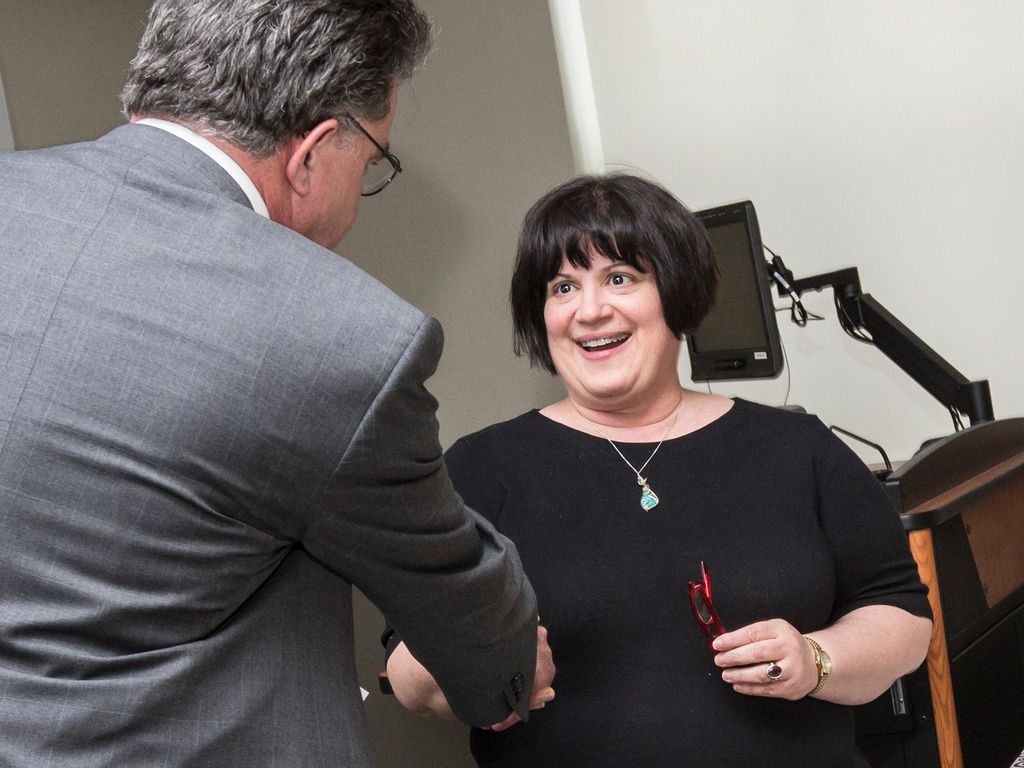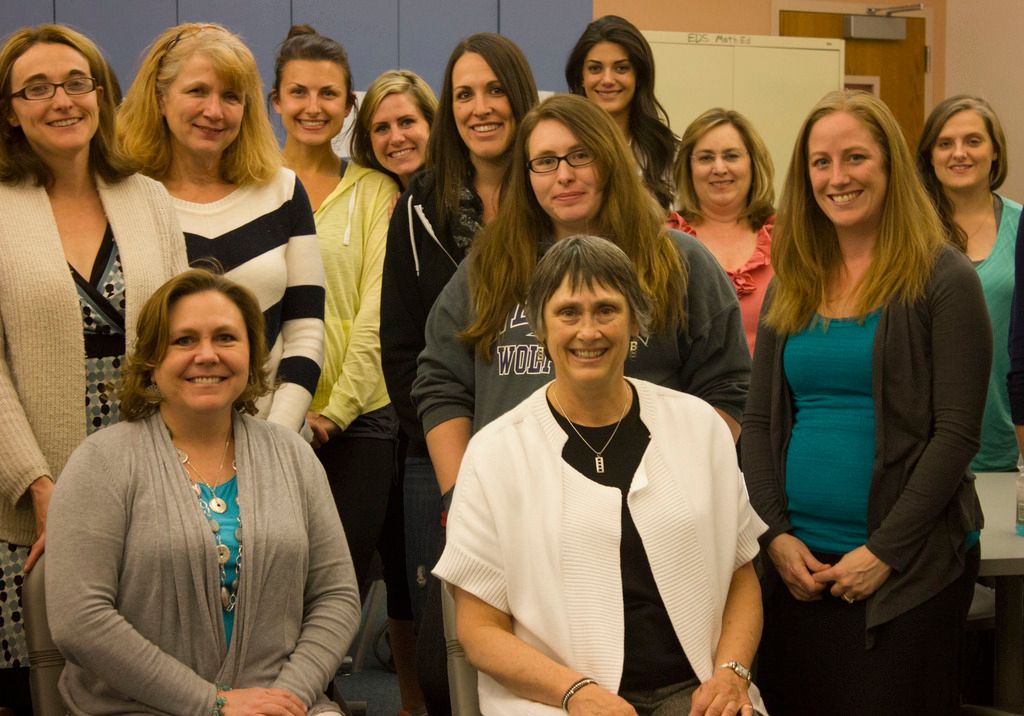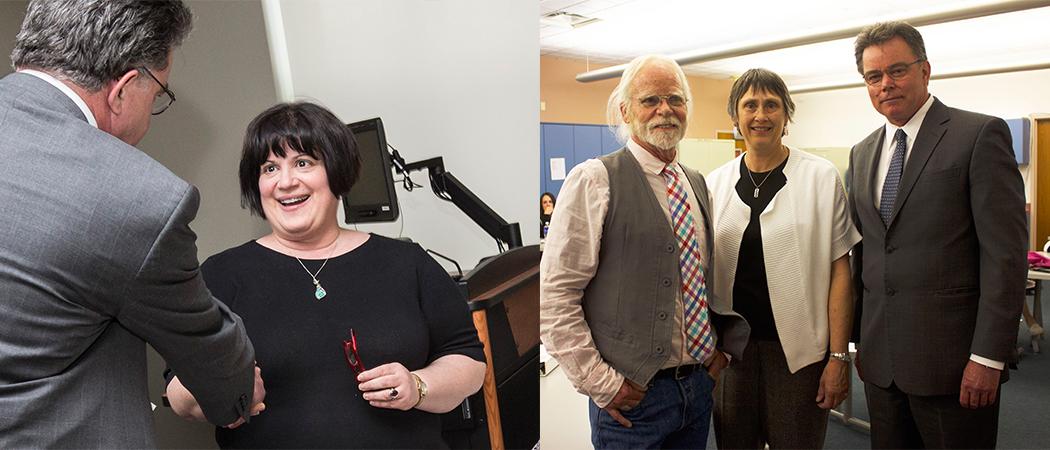Though the academic disciplines were different, the similarities were abundantly clear.
As Ed Keppelmann sat in the back of the classrooms of Linda Curcio and Lynda Wiest this year, observing two masterful teachers in his role as chair of the selection committee for the F. Donald Tibbitts Distinguished Teaching Award, it became quickly apparent he was watching a couple of kindred spirits in action.
Both Curcio, an associate professor of history, and Wiest, a professor of mathematics education, engaged their students in meaningful ways.
Listening to Curcio was like listening to a person skilled in giving stories, in relating them to her students and what they were thinking at that very moment. In turn, her students seemed enamored with Curcio's deft descriptions, her sense of humor, her ability to weave the context of "then" and intertwine it with the context of "now."
Two Tibbitts Teaching Award Winners

Executive Vice President and Provost Kevin Carman surprises and congratulates associate professor of history Linda Curicio with one of the two 2015 F. Donald Tibbitts Distinguished Teaching Awards.

Lynda Wiest (sitting right), professor of mathematics education, poses with students and colleagues, after a surprise announcement that she was one of the two 2015 F. Donald Tibbitts Distinguished Teaching Award recipients.
Wiest, many of whose students were, in fact, teachers themselves, helped her charges delve more deeply into what they were teaching, and how they were teaching it. Hers was the rare gift of getting inside the mind of a student, and connecting the mind with key concepts and ideas that could unlock new understanding and application.
"Firstly, Linda Curcio is a masterful story teller," said Keppelmann, an associate professor of mathematics and himself considered one of the University's best teachers. "And not only that, she puts you in the time and place of her story, giving you the context of the current norms and thinking of the time and then asks what would people of the day do? The setting is so impeccably constructed that the conclusions you reach are obvious and you understand why things played out as they did. She also does a fantastic job in providing an environment where students can learn to tell the stories that they find in their research of history.
"Lynda W. teaches teachers how to teach problem solving: How do you watch a kid and know what they are thinking? How do you let them struggle productively? Why do you let them construct their own knowledge and achieve success on their own terms? As Paul Halmos, a famous mathematician once said, 'The major part of every meaningful life is the solution of problems.' Teaching kids to solve problems is therefore an incredibly worthy endeavor. In mathematics a great lecture involves someone presenting a clear, concise and elegant solution to a meaningful problem. What Lynda empowers is an entirely different - yet equally wonderful - set of knowledge and skills."
It was no wonder then, then, that over the course of two days, on the afternoons of March 30-31, Provost Kevin Carman led a group of deans, administrators, Tibbitts committee members and colleagues into the classrooms of Curcio and Wiest to present the professors with the news that they had been selected as winners of the 2015 Tibbitts Award.
Both professors were surprised, moved and almost at a loss for words.
Along with College of Liberal Arts Dean Heather Hardy, Carman announced to Curcio's class on March 30, that, "I apologize for barging in. I know you're just getting warmed up." Seeing paper plates of food in front of the dozen or so students in Curcio's class, Carman smiled and quipped, "I can see now why you have such high rankings."
More seriously, Carman added that Curcio's many talents - her enthusiasm for her subject, her deep-seated knowledge, her warm, approachable personality, and perhaps above all else her evocative storytelling ability - were what truly set her apart. He recited some of the many testimonials written about Curcio from her students, students who recalled how they "loved" her class, who they always felt every class was meaningful, how they never left a class "not learning something important."
When Carman presented Curcio with the award, Curcio smiled somewhat sheepishly.
"OK," she said of all of the attention she was receiving, from colleagues such as Darrell Lockhart, an associate dean and associate professor of Spanish in the College of Liberal Arts (Curcio is fluent in Spanish and over the years has integrated the languages and literature of Latin America and Mexico into the courses she teaches), "OK, I'm a little freaked out. I can't believe you all came."
To which Hardy said, with a laugh, "It's a long tradition we have of freaking people out with this award."
"I told them (her class) if I won the award we'd have a big party at my house," Curcio said. She looked to her class, who were all smiles and supportive fist pumps and cheers of "Viva Mexico!" She added, softly, "This has little to do with me." She pointed to her class. "And everything to do with my students."
The next day, Carman's entrance into Wiest's classroom required the skilled intervention of Thomas Harrison, an associate dean for the College of Education. With award party in tow, Carman had grabbed the handle of Wiest's classroom on the second floor of the William Raggio Building and ... immediately found it locked.
Harrison quickly provided a key, unlocking the door with prompt enthusiasm.
Flanked by several of Wiest's College of Education colleagues, Carman's entrance into the classroom cut Wiest off in mid-sentence. Many of the students in the classroom were now teachers themselves, many of whom had taken Wiest when they were undergraduates. They all applauded as Wiest, sitting on a chair at the front of the class, seemed to be moved almost to tears as Carman told the class, "You may have heard of the Tibbitts Award ..."
Carman recalled his own experience with Wiest, having recently been a guest speaker in one of Wiest's classes. He came away from the experience impressed. He called her "extraordinary in the classroom," adding that Wiest "cares so deeply about all of her students. She is someone I have great admiration for."
After joking that "class was dismissed" upon receipt of her award, Wiest added that, her voice full of emotion, "This means more to me than you can know ... I do it ..." She then pointed to her students. "... for them."
And there it was again.
More similarities than differences.
As both Curcio and Wiest were quick to point out, the Tibbitts Award had little to do with them. And yet, as their students and their colleagues would surely argue, the excellence of their teaching and their passion for their profession ... that had had everything to do with them.
Added Keppelmann: "Many of us do great teaching some of the time. But these people do it as a routine practice."












